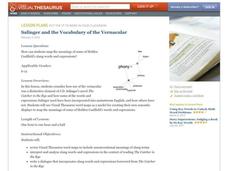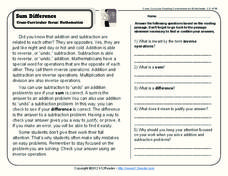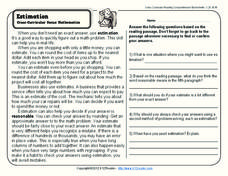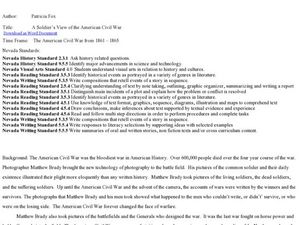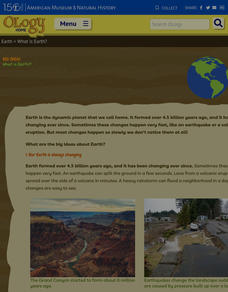Have Fun Teaching
Making Inferences (19)
Good readers use what they know and clues found in a story to make inferences about what a writer wants readers to consider. Here's a graphic that supports this comprehension strategy and asks kids to record what they know, the clues...
Curated OER
Old Lady That Swallowed a Fly
Youngsters listen to the story, "There Was an Old Lady Who Swallowed a Fly." After discussing the story, going over new vocabulary, and repeating the rhymes in the story, they study the parts of a fly. They finish by creating a fly on...
Curated OER
Salinger and the Vocabulary of the Vernacular
Writers explore vocabulary and expressions used in the English language. They use visual word maps to become aware of the different uses of words which will allow them to more readily interpret texts. Then they listen to/read excerpts...
Curated OER
Sentence Completion 2: Low-Advanced SAT Level
Contemplating a test-prep unit? A reading comprehension strategies session? Check out this sentence completion instructional activity. After test takers try their hand at a sentence completion exercise, they can use the detailed answers...
K12 Reader
Sum Difference
If you need a way to address math and reading in one lesson, look no further than a passage about inverse operations, complete with reading comprehension questions. Kids focus on context clues to determine the meanings of unfamiliar words.
Curated OER
Comprehension: Identify Story Grammar
This fully scripted lesson could be a big help for someone new to teaching Kindergarten. It outlines what you should do and say as you teach grammar and literary elements such as, main character, setting, and events through reading. The...
Curated OER
Inferences Using Evidence
What is an inference, and how can you use textual evidence to create one? Introduce your developing readers to the world of inferencing with this presentation. Terms are defined, and several examples are shown. The class works together...
K12 Reader
Estimation
When is it a good idea to use estimation? Learn about estimation and rounding with a reading comprehension lesson. After kids read a passage about estimation, they answer five comprehension questions on the other side of the page.
Curated OER
Because of Winn-Dixie
Readers analyze an excerpt from Kate DiCamillo's novel Because of Winn-Dixie. They read silently, and then hear it read aloud. Definitions for underlined vocabulary words are in the margin, and other potentially difficult words are in...
Curated OER
A Soldier's View of the American Civil War
Study and research the American Civil War in this explanatory writing lesson. Middle schoolers complete six activities to learn about the American Civil War and soldiers' views of the war. The lesson includes several options to complete...
Curated OER
Vocabulary Review: Word Meanings
Provide this to your class as they learn to develop vocabulary. There are 10 questions, and the reader must read the sentence and guess the meaning of the bolded word. There are three choices for each question.
K12 Reader
What is Culture?
What makes up a society? Read a passage about culture and community and answer five reading comprehension questions.
American Museum of Natural History
What is Earth?
Humans have only inhabited Earth for a short part of its existence. An online resource explains how scientists use clues from rocks and fossils to piece together information about Earth prior to humans. The online instruction includes...
K12 Reader
Galileo and His Telescope
Learn about Galileo Galilei's contribution to modern science with a reading passage that focuses on reading comprehension. After kids read several paragraphs about his life, they answer five questions about the information they have just...
Curated OER
Sentence Completion 7: High-Intermediate Level
Need another sentence completion worksheet? The great thing about this one is the extensive answer/explanation key that accompanies the exercise. The key pinpoints the clues, strategies, and logic used to determine the correct answer...
Have Fun Teaching
When Am I? (16)
How can you tell when a story takes place? Use context clues to infer the time of day and seasons of five short reading passages. Kids then note each passage's time period as daytime or nighttime, as well as winter or summer.
K5 Learning
Humming Birds
Seeing a hummingbird in the wild can be a magical experience. Learn more about these delicate members of the animal kingdom with a short reading passage, complete with four short-answer questions.
Curated OER
"Guermo's Surprise"
Have you ever thrown a surprise party? Use this question to engage your intermediate English language learners. After a brief discussion, read the passage "Guermo's Surprise," and have learners answer the 10 multiple-choice questions...
Curated OER
Tunes for Bears to Dance to: Graphic Organizer Strategy
"What are Henry's options?" "What do you think Henry will do?" To better understand the central conflict for the main character in Robert Cormier's Tunes for Bears to Dance to, class members engage in a compare-and-contrast activity that...
Curated OER
Reading Clues
Critically Evaluating Alarming News students use a guided reading strategy to explore news articles about the Washington-area sniper attacks, and conduct a roundtable discussion to investigate public reaction to the case. October 17, 200
Curated OER
Nouns and Verbs
For this nouns and verbs worksheet, students read context clues in sentences, choose words from the word bank to fill in the blanks, and logically complete sentences. Students complete six sentences.
Curated OER
Calculator Clues
For this math worksheet, students solve 10 problems using a calculator. Students turn the calculator upside down and match the words they see with 10 clues.
Curated OER
What's the Right Meaning?
In this recognizing and correcting mistakes in sentences instructional activity, students read two sentences, discover the mistake in the second sentence, and use words in the word bank to correct them. Students write 8 answers.
Curated OER
Communicating My Ideas; Developing Self-Expression in Writing
Fifth graders identify new vocabulary. In this vocabulary lesson, 5th graders predict the meaning of unfamiliar words. Next they find them in a dictionary and use them in a sentence.




